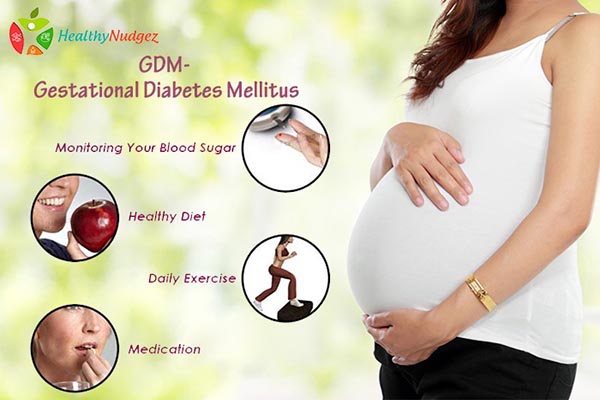GDM- Gestational Diabetes Mellitus
It is the diabetes diagnosed during pregnancy
It is defined as the glucose intolerance with onset or first recognition during pregnancy. According to the maternal health division India, one in 10 pregnancies is associated with diabetes, 90% of which are diagnosed with Gestational Diabetes. In India, the rate of GDM are estimated to be 10-14.3% which is much higher than the west.
Evidence suggests that women who develop GDM have altered functions of β-cells and insulin resistance, which decreases their capacity to deal with metabolic challenges of pregnancy.
Untreated or undiagnosed GDM may cause significant maternal & foetal complications, which cannot be reversed. Moreover, women with GDM and their offspring are at increased risk of developing type 2 DM later in life.
GDM risk for mother are:
- Polyhydraminos (excess of amniotic fluid, seen in 1% of pregnancies)
- Prolonged labour
- Caesarean section
- Infection
Other risk of GDM for Fetal (baby) are:
- Abortion
- Still-birth
- Birth injuries
- Risk of becoming obese adults
- Neonatal Hypoglycaemia (low sugar of baby)
- Infant respiratory distress syndrome and many more.
Medical professionals prefer diet modification, as the first line treatment for GDM, depending on the levels of blood glucose. Medical nutrition therapy (MNT) is the most formative approach. There is always a hope that optimal nutrition therapy will offer a lower-cost and non-pharmacological treatment for increasing number of women with GDM. Initiation of nutrition therapy can help prevent sugar spikes, post prandial glucose levels, and delay the initiation of medical drug therapy.
MNT primarily focused on the carbohydrate restriction, more complex and nutrient dense carbohydrate, and high fibre food are recommended.
GDM management through Medical Nutrition therapy:
- Take adequate energy for appropriate gestational weight gain is important, energy requirement during pregnancy is determined on individual basis and it includes the normal requirement of an adult and an additional requirement for foetal growth plus the associated increase in the body weight of pregnant woman.
- Take small frequent meals, at an interval of every 3 hours. Eating too much at one time can cause rise in blood sugar levels.
- Avoid starchy vegetables such as potato, colocassia, jackfruit, raw banana etc. Can take all legumes and beans.
- Choose complex carbohydrates like whole grain cereals such as oats, jowar, ragi, bajra along with vegetables, fruits and whole pulses, in place of simple carbohydrates such as sweets, bakery products, pizza, naan, white bread or anything made up of white wheat flour all of which should be avoided. And include more of fibre in your diet.
- Limit fruit portions, as they are high in natural sugars. Eat one fruit at a time and two serving in a day can be taken. Avoid fruits with high GI (Glycemic Index) and GL (Glycemic Load) value. Fruits which are allowed are: apple, orange, watermelon, kiwi, pomegranate etc.
- Taking a good amount of protein is advisable, especially in breakfast as the post- breakfast blood sugar rise will not occur.
- Drink at least 8 cups (or 64 ounces) of liquids per day, including buttermilk (chaach), lemon water plain, homemade soups etc. And avoid juices completely including other sweetened beverages.
- Make sure you are getting enough vitamins and minerals in your daily diet.
- Take calcium-rich food to help ensure that you are getting 1200 mg. of calcium in your daily diet, such as ilk and other dairy products.
- Eat at least three servings of iron-rich foods per day to ensure you are getting 30 mg of iron in your daily diet. Sources of iron include enriched grain products (rice); lean meat, poultry and fish; eggs and leafy green vegetables, lotus stem.
- Take at least one source of folic acid every day, sources include dark green leafy vegetables, fortified grain products, legumes (lima beans, black beans, black-eyed peas and chickpeas) and fruits.
- Avoid alcoholic beverages during pregnancy, alcohol is linked to premature delivery and low birth weight babies and can also raise the blood sugar levels.
- Use artificial sweeteners approved by the Food and Drug Administration for safe use during pregnancy. These FDA-approved sweeteners include aspartame and acesulfame-K. The use of saccharin is strongly discouraged during pregnancy because it can cross the placenta and may remain in foetal tissues. Look at the label of the sweetener or talk with your health care provider about how much non-nutritive sweetener is acceptable during pregnancy.
- 30-40 mins of walk or any other physical activity should be included in your daily routine. The walk can be divided into 2 intervals, morning and evening or as advised by the health care professional.
Note: Keep a watch on your daily blood sugar levels and also keep a record of your daily diet and activity routine.
Free Consultation with : Best Nutritionist in Delhi


Thanks for the valuable content
Nice infromation sir
Good sir